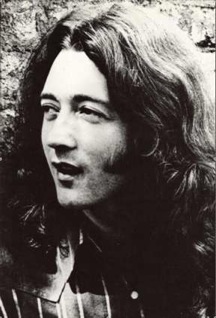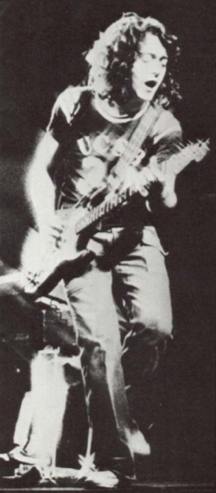Apr 15 2010
Rory Gallagher’s 1980 Australian Tour — Part 2
Another excerpt from the 1980 Australian Tour Program. Part 2: A brief history of Rory Gallagher and his band, from his earliest years up until 1978. Once again, thanks go to Glenn Shambrook for providing the scans of the Tour Program. You can download a copy of the entire Tour Program (1.8 mb file size) here: 1980 Tour Program.
 Rory Gallagher is the man who spearheaded the Irish rock movement. He has often been acknowledged as one of the finest blues musicians treading the boards: a guitar virtuoso and one of the finest slide players in the world.
Rory Gallagher is the man who spearheaded the Irish rock movement. He has often been acknowledged as one of the finest blues musicians treading the boards: a guitar virtuoso and one of the finest slide players in the world.
There wasn’t much doubt where Rory was heading from the beginning. Born in Ballyshannon, County Donegal, he moved at an early age to the town of Cork in the south-east corner of Eire and regards that as home.
He has been playing guitar almost forever. He bought his first real guitar when he was nine — it cost four pounds. It replaced an earlier plastic model from Woolworths, on which he had delighted friends and relations with hit by Gene Autry and Roy Rogers. He remember enjoying Elvis, Buddy Holly and Chuck Berry, and getting into blues the traditional second-hand way: hearing of Leadbelly and Woody Guthrie through skiffle player Lonnie Donegan.
Rory joined an Irish show band at the age of fifteen while attending school because it was the only way at the time to play consistently and keep himself in guitars and amps. With the Fontana Show Band, Rory was able to tour England and Ireland, atune himself to life on the road (which still doesn’t faze him) and play whole half-hours of Chuck Berry, Eddie Cochran, or whatever he pleased to. He did tire of having to play the rest of the band’s non-rock’n’roll repertoire, so after a short period of getting it together, he left to tour small clubs throughout Europe with the show band’s bass player and drummer.
Then in 1965, Rory formed the original “Taste”, a legendary Irish blues-based band comprised of Eric Kitteringham on bass and Norman Damery on drums. Taste played the clubs in Ireland and Germany, and while supporting groups that included John Mayall, Cream, and Aynsley Dunbar in Ireland, word got back to England that this power trio (formed before Cream) were hot.
The band made the big move to London in 1969, signed with Polydor and the Robert Stigwood agency, and cut two albums entitled “Taste” and “On The Boards”. It was their live appearances that set them apart, though: the result was their live release “Got Big Quick”. Although they were compared to Cream, Taste’s premise was more complicated; much more Jazz-oriented, with Rory picking up the saxophone for a few numbers.
 Taste broke up in 1970, and by early 1971, Rory had formed a new band releasing the album “Rory Gallagher”, somewhat more complex and less raucous than the Taste albums, perhaps due to Rory’s 1969-70 jazz-oriented period.
Taste broke up in 1970, and by early 1971, Rory had formed a new band releasing the album “Rory Gallagher”, somewhat more complex and less raucous than the Taste albums, perhaps due to Rory’s 1969-70 jazz-oriented period.
At the same time, Rory was honoured by being one of the first sidemen chosen by his idol Muddy Waters for the “London Sessions” album. Rory and his band toured America in 1971, then cut two more albums: “Deuce” in 1971 and “Live In Europe”, a monster seller, in 1972. Then followed “Blueprint”, “Tattoo”, “Irish Tour ’74” (another hit, and no wonder, Rory being the consummate live musician) and “The Story So Far”, a compilation of some of Rory’s finer moments from the previous albums.
In 1975, Rory Gallagher signed with Chrysalis Records and released “Against The Grain” to the same critical acclaim that greeted his subsequent American tour. Rory’s second Chrysalis release, “Calling Card” was further indication that although he feeds off the energy of his enthusiastic audiences, he is perfectly capable of playing masterful guitar, both electric and acoustic, within the confines of the studio. Rory co-produced the album with former Deep Purple bassist Roger Glover.
In1978, Gallagher disbanded his band and pared his sound back to a three-piece to record the hard driving “Photo-Finish” album, with long time bassist Gerry McAvoy and former Sensational Alex Harvey drummer, Ted McKenna in support.
To measure the meticulousness with which Rory had been re-plotting his career, you have only to consider that his previous album,”Calling Card”, which in itself marked a slight change in musical direction, was released in October 1976.
The intervening period saw Gallagher cut down on touring substantially and return to Ireland for a re-think, then he came back to Britain for a brief tour which, in retrospect, can be viewed as a goodbye to a four-year period.
to be continued….

RORY to me, & l’m a guitar teacher; bought up on west coast jazz & classical music; the best musos!! But RORY IS THE GREATEST. No doubt. This beautiful soul has taught me so much. Thank you RORE: U’ LL ALWAYS BE NO ONE TO ME. Your BELINDA